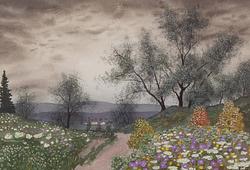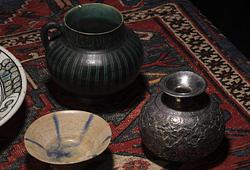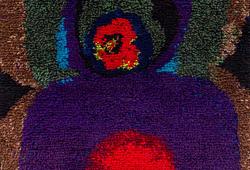Staffan Hallström
"Gunghästar i batalj"
Staffan Hallström and dated -74. Canvas 210 x 220 cm.
Alkuperä - Provenienssi
Gallery Argo, Stockholm.
Näyttelyt
Tomarps kungsgård, "Staffan Hallström", 1 July - 5 September 2001.
Kirjallisuus
Helsingborgs Dagblad, 2001, ill.
Muut tiedot
Staffan Hallström's colorful and enigmatic compositions are the most beloved and recognizable works of his generation. His best-known motif, Ingens hundar (Dogs of the Night), was Hallström's (1914-1976) big public breakthrough. In a poll of the most popular works at Moderna Museet, Ingens hundar came an honorable second place.
Staffan Hallström studied under modernists such as Isaac Grünewald and Olle Hjortzberg at the Royal Academy of Fine Arts in Stockholm in the second half of the 1930s. During this period he also came into contact with older painting that influenced his view of art. Names like Delacroix, Rubens Tizian, Géricault and Goya became his household gods. It was also during this time that he developed his particular style of drawing, with many double lines that together form movement, depth and volume.
The first part of the 1950s was difficult, with divorce and bad reviews, before easing up in the 1960s with a new marriage and very positive reviews in connection with a major exhibition at the Royal Academy of Fine Arts in 1961. Now his childhood memories began to be reflected in his motifs. The rocking horse is joined by the tin soldiers and the game of chess. “In many paintings, the individual motifs are also mixed and an army of rocking horses can be set up on a chessboard with a horde of rats as opponents. The chessboard becomes the place where the game of life, with life as the stake, takes place. The Riders' Battle (...) is a study of movement in which Staffan Hallström has gone back in history and used Ruben's copy of Leonardo da Vinci's “The Battle of Anghiari” as a starting point. Exhibition catalog Länsmuseet Gävleborg, “Staffan Hallström och Asmund Arle - Genom världen i former”, 15.10.2011 - 19.2.2012.
A variant of the auction's “Gunghästar i batalj” hangs at the Ministry of Civil Affairs in Stockholm.



































































